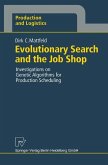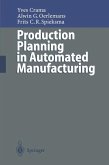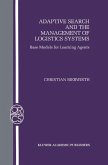The book considers the lot-sizing and scheduling problem for flexible flow line production facilities. Flexible flow lines are flow lines with parallel machines on some or all production stages. They can be found in a vast number of industries. A three-phased solution approach is presented that solves the integrated lot-sizing and scheduling problem in a hierarchical manner. The approach is able to handle several important features relevant in industrial practice, such as back-orders and setup carry-over. The developed solution procedures solve practically sized problems in a relatively short amount of time. One of the procedures is based on a novel mixed integer programming (MIP) model, which employs integer variables instead of binary variables. This makes it possible to find (near-)optimal solutions using standard algorithms such as CPLEX. Another procedure uses two nested Genetic Algorithms. An application of the framework in the semiconductor industry is given.
Das schonste GlUck des denkenden M ens chen ist, das Erforschliche erforscht zu haben und das Unerforschliche ruhig zu verehren JOHANN WOLFGANG VON Gm~THE In the sense of Goethe, I hope this book helps to shift the fine line between the inaccessible and the explorable a little bit in the direction of the latter. It has been accepted as a doctoral dissertation at the Faculty of Business Admin istration and Economics of the Catholic University of Eichstatt-Ingolstadt, Germany, and has been a great pleasure to write~at least most of the time. At the other times, the following people helped me to get around the moun tains that seemed too high to climb: First of all, these were my parents, whom I thank for their continuing support. This 'thank you' is extended to my brothers Marcel and Dominik and of course to Angelika, who has strengthened me with love through the sometimes arduous campaign. Further, I thank my academic advisor Prof. Dr. Heinrich Kuhn and my colleagues Dr. Georg N. Krieg and Florian Defregger for many fruitful discussions and helpful thoughts. I also thank Prof. Dr. Klaus D. Wilde for refereeing the thesis.
Das schonste GlUck des denkenden M ens chen ist, das Erforschliche erforscht zu haben und das Unerforschliche ruhig zu verehren JOHANN WOLFGANG VON Gm~THE In the sense of Goethe, I hope this book helps to shift the fine line between the inaccessible and the explorable a little bit in the direction of the latter. It has been accepted as a doctoral dissertation at the Faculty of Business Admin istration and Economics of the Catholic University of Eichstatt-Ingolstadt, Germany, and has been a great pleasure to write~at least most of the time. At the other times, the following people helped me to get around the moun tains that seemed too high to climb: First of all, these were my parents, whom I thank for their continuing support. This 'thank you' is extended to my brothers Marcel and Dominik and of course to Angelika, who has strengthened me with love through the sometimes arduous campaign. Further, I thank my academic advisor Prof. Dr. Heinrich Kuhn and my colleagues Dr. Georg N. Krieg and Florian Defregger for many fruitful discussions and helpful thoughts. I also thank Prof. Dr. Klaus D. Wilde for refereeing the thesis.









